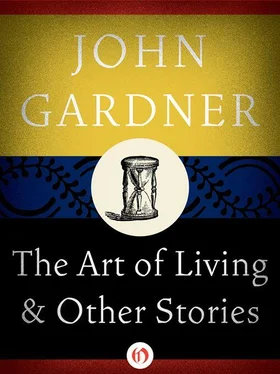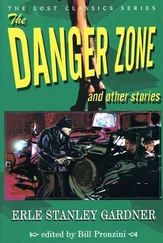She came in walking fast, long-legged, sailing, her expression intense, as if expecting a fight and hoping this once she might get out of it. “Hi, Pop,” she said, chewing gum, not meeting his eyes, pulling her coat off. She had her outfit on, black with white around the collar and the hem of the skirt. She wore these push-up bras, and the collar was as low as the skirt was high. She couldn’t be blamed for it, that was what waitresses wore in such places; but when she came to your table she liked to lean way over and make you nervous, and that I did blame her for, a little — as did her father, watching — not that I wanted her to stop. It didn’t mean a thing, though, or meant the opposite from what it said. I’d figured out long since that in her heart of hearts she was a nun, maybe a physicist. I guess the real truth is, Angelina hardly knew what she wanted herself. She was a straight-A student, a virgin, a tease — church-scared, father-scared; the usual business. In the days of Playboys right out in the livingroom, she might as well have been back in Calabria, winking at goatherds, warning them back with a knife.
“Hi, Arnold,” she’d always say, smiling. Not a word to us.
He would smile back, blissful, squeezing his eyes shut. “Hi, Angelina.” It was obscene. But he’d known her since she was zero, of course. He had uncle’s rights.
She would say, jabbing out at us with the filthy wet rag she wiped the table with and maybe tossing a quick look at her father, “You guys should pay rent. You ever try walking around outside in the sunshine?” Big smile, eyes like dark jade. I used to wonder if it ever occurred to her that one of these days, for all her glory, she’d have to marry one of us and have babies and get fat. I took it for granted that that was how it would end. Who could have believed, in a town like ours, that a little more than a year from then, Angelina would be trying to close down Cornell University, shouting angry slogans in doggerel verse, and firing windy, ranting letters at me—“Dear Finnegan”—in some Asian swamp?
As soon as she’d left us, Arnold would wipe his forehead and start up again, folding his pink hands on the tabletop, smiling like a pink-faced priest in the direction of Angelina.
This day he said, “You wonder why she’s so attracted to me, right? Maturity, boys. Maybe I can give you some pointers.” He tapped the tips of his fingers together.
“Hey, Mr. Deller, do that,” Lenny Cervone said, holding his hands out to Arnold and wiggling the fingers as if to lure out words. Lenny — Lenny the Shadow — was the toughest of us, at least he looked it. Even right after he shaved, before he stopped doing that, he had five-o’clock shadow. We all leered and waited.
Arnold smiled and stretched his chin. “Your trouble is,” he said, “you just circle. That’s for goldfish. No offense! Listen, the world’s in chaos, right?” He leaned forward over his elbows, eyebrows lowered, wincing a little, as if thinking hard made his head ache. “War, revolution, students rioting, police rioting, drugs and promiscuity … Let me tell you something: it will pass. Nobody believes that, nobody thinks about afterward — hell no! — but let me tell you, it will pass! After the world-wide glorious high there’s going to be a crash like the world never dreamed of. Things will be changed, even here, in a backwater hick-town like this one, but whatever the world’s like afterward, we’re gonna be stuck with ourselves again — ourselves! It’s a gloomy prospect. A person could go crazy!” He smiled and pushed out his chin in the direction of Tony Petrillo. “It’s easy to throw yourself at grand ideals, and it’s also easy to cut out, call everything nonsense. It’s even natural, right now: the world’s in the middle of a big noisy party; but eventually the party will be over, you mark my words. All this wild scrambling, all this floundering and screaming, people killing each other, making love in the street — one of these days you’ll wake up and it’s gonna be quiet out. Maybe a few storm-troopers or black-suited businessmen keeping order. But quiet, everywhere. Nothing moving. People will be stuck with themselves again.” He drew back and wiped his mouth. His hands were shaking, though he grinned and tried to hide it. “It’s no good, this backing off from things. Don’t worry, I know what you’re up to, you guys. I know what everybody’s up to.” He looked over at Joe. “You think I’m not tempted to back off, just throw up my hands and say the hell with it? But it’s no good, leads straight into craziness. The thing a person’s gotta have — a human being — is some kind of center to his life, some one thing he’s good at that other people need from him, like, for instance, shoemaking. I mean something ordinary but at the same time holy, if you know what I mean. Very special. Something ritual —like, better yet, cooking!” He stretched back his lips — no doubt he meant it for a smile — and closed his eyes.
It made us all uneasy, the way he’d plunged straight into it, no fooling around, no glancing back. Then Lenny the Shadow snapped his fingers and said, “That’s it! Pass me the stove!”
We all pretended it was funnier than it was, hitting each other on the shoulders lightly, saying “Hoo!” and “Shit!” (Sometimes it was a lot of work, just hanging around.) Angelina glanced at us from her barstool, letting us know we were deep-down boring. Joe went on mechanically wiping things, one small muscle in his jaw working. Only the cook showed any mercy. He looked away from Lenny and, without raising the heel of his hand from the tabletop, pointed at Benny the Butcher — that was what we called him, nobody remembers why. He had a bushy long black beard, Indian headband, little gold-rimmed glasses.
“You smile,” the cook said, mostly for rhetoric, since Benny the Butcher was always smiling, his look faintly rueful, staring at the table or the wall or the floor, slightly moving his head as if slowly and thoughtfully saying “No.” He had something a little bit wrong with his eyes. “You smile,” Arnold said, “but you’ll see, believe me! People can get the idea life’s just instinct, no trick to it. But we’re not animals, that’s our great virtue and our terrible dilemma.” He raised one finger, solemn, a kind of ironic apology for the super-fancy talk. “We’ve got to think things out, understand our human nature, figure out how to become what we are.”
“ Plan a head, ” Tony Petrillo broke in. “Plan a head!” He smacked his right fist into his left hand, almost missing though he was watching so hard his eyes crossed. Nobody paid any attention to him. Nothing Tony ever said made any sense. He claimed he’d gone crazy from watching Walter Cronkite. He always tried to get the channel turned before Cronkite said, “That’s the way it is.” Tony was gangly-armed, swing-headed, clumsy. He was so out of it that one time when we stopped for a redlight he forgot to put his feet down and tipped over, damn near caught the bike on fire. His ambition in life was to run a skull-crusher in some big city. It was a scary idea. Actually he ended up working in a V.A. hospital.
“What are we?” Arnold said, moving his hands across the tabletop, palms up, toward me. I was always the one that paid the closest attention and made the fewest jokes. I don’t brag about it. I was just never very funny. “Big super-apes with enormous brains,” Arnold said. He suddenly looked angry, as if it were the fault of the Scavengers gang that people were just apes. “Enormous brains relatively speaking, I mean,” he said. “Half-wit morons compared to whales, but never mind. Big brains relatively — anyway big enough that they’ve tuned out the body, if you know what I mean. What animals know by instinct has a hard time getting through to us, except for the really big instincts, the ones that knock your block off. So what are we? What can we deduce about, to coin a phrase, the Art of Living?” His lips shook.
Читать дальше












